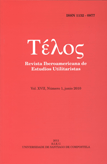Vol. 1 Núm. 1 (1992), Artículos
Recibido: 28-11-2012
Aceptado: 28-11-2012
The moral value of Religion could be doubtful from an utilitarian evaluative standpoint. J. S. Mill analysis about that question in Utility of Religion is well-known.However Hume's similar study in his Enquiry Concerning the Principies of Morals is not known in the same degree. There Hume writes that we consider something a virtue when (1) it is useful to others; (2) it is useful to the subject himself; (3) it is immediately agreeable to others; or ( 4) it is immediately agreeable to the person himself. But, if everything which is useful or agreeable must be considered a virtue, onthe contrary everything useless or disagreeable must be a vice. That is the case with Cristian, monkish, or religious virtues, or «vices»?, in general terms.
David Hume, John Stuart Mill, religión, utilitarismo clásico






